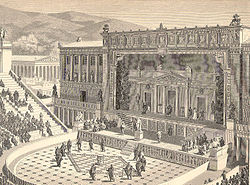Dionysia
Dionysia ( Greek Διονύσια Dionysia ) was a festival in ancient Greece in honor of the god Dionysus , the god of ecstasy , intoxication , metamorphosis and wine. What began as a religious cult of Thracian origin with parades (see Maenad , Orpheus ), developed in Athens into a festival , the so-called urban Dionysia . From the ritual singing, dancing and sacrificial rites which developed Greek tragedy and comedy in a religious context.
The festival of urban Dionysia was probably first introduced under the Peisistratids or was previously insignificant. Little is known about the exact course of the festival at the time of the tyrant rule. From 534 BC There is evidence of the competitions of tragedy poets at Dionysia. The Athenian polis , which was free of tyrants from 510, continued the festival for self-representation. During this time, the festival, which took place annually in March and April, lasted a total of eight days.
procedure
Two days before the Dionysia: Proagon - The poets of tragedies (probably also of comedies) introduced themselves with their actors and choirs as well as the piece they performed. Little is known about this, however.
Eve of Dionysia: Collection of the cult image of Dionysus (a phallos ) from a temple outside the city to its traditional festival place in the theater.
1st festival day: Great procession, festival sacrifice, agon of the dithyrambe choirs (ten male and ten boys' choirs, one from each phyle ). Tributes from the allies of the Attic League were exhibited in the Dionysostheater , the sons of the men who fell in the war received armor and deserving citizens were honored (since 509 BC).
2nd festival day: Komödienagon, five (in times of crisis three) comedies vied for the favor of the judges drawn (since 486 BC).
3rd to 5th Feast day: Tragödienagon, a tetralogy was performed per day , which consisted of three tragedies and a satyr play (since 534 BC, also shortened in times of crisis). On the same day there was also a popular meeting in the theater, where the winners of the Agone were honored.
Other important festivals in honor of Dionysus were the rural Dionysia and the Lenées , which take place in winter , at which a dramatic agon - with a clear accent on the comedy - was given.
Winners lists
tragedies
- 484 BC BC - Aeschylus
- 476 BC BC - Phrynichos ( The Phoenicians )
- 472 BC BC - Aeschylus ( The Persians )
- 471 BC BC - Polyphrasmon
- 468 BC BC - Sophocles ( Triptolemus )
- 467 BC - Aeschylus ( seven against Thebes )
- 463 BC BC - Aeschylus ( The supplicants )
- 458 BC BC - Aeschylus ( Oresty )
- 449 BC BC - Herakleides, an actor with an inscription
- 442 BC BC - Sophocles ( Antigone )
- 441 BC BC - Euripides
- 431 BC BC - Euphorion , son of Aeschylus; 2nd place Sophocles; 3rd place Euripides with Medea
- 428 BC BC - Euripides ( Hippolytus with a wreath )
- 427 BC - Philocles, nephew of Aeschylus; 2nd place Sophocles with King Oedipus
- 415 BC BC - Xenocles
- 409 BC BC - Sophocles ( Philoctetes )
- 405 BC BC - Euripides ( The Bacchae )
- 401 BC BC - Sophocles ( Oedipus on Colonus )
- 372 BC BC - Astydamas
Comedies
- 486 BC BC - Chionides
- 472 BC Chr. - Magnes
- 458 BC BC - Euphonios
- 457 BC BC - Kratinos
- 450 BC BC - Krates
- 446 BC BC - Callias
- 445 BC BC (or soon after) - Telekleides
- 437 BC BC - Pherekrates
- 435 BC BC - Hermippus
- 426 BC BC - Aristophanes ( The Babylonians )
- 425 BC BC - Eupolis
- 423 BC BC - Kratinos ( The Bottle ); 2nd place Ameipsias ( Konnos ), 3rd place Aristophanes ( The Clouds )
- 422 BC BC - Kantharos
- 421 BC BC - Eupolis ( The Flatterers ); 2nd place Aristophanes ( Peace )
- 414 BC BC - Ameipsias ( Komastai ); 2nd place Aristophanes ( The Birds ), 3rd place Phrynichos ( The Hermit )
- 413 BC BC (or soon after) - Plato
- 402 BC BC - Kephisodorus
- 290 BC BC - Poseidippus
- 278 BC BC - Philemon
- 185 BC BC - Laines
- 183 BC BC - Philemon
- 154 BC BC - Chairion
See also
literature
- Marie-Hélène Delavaud-Roux: Les danses dionysiaques en Gréce antique. L'univ. de Provence, Aix-en-Provence 1995, ISBN 2-85399-360-4 .
- Otto Gilbert : The festival time of the Attic Dionysia. Vandenhoeck & Ruprecht, Göttingen 1872.
Individual evidence
- ↑ Helaine Smith: Masterpieces of Classic Greek Drama . Greenwood, 2005, ISBN 978-0-313-33268-5 , p. 1.
